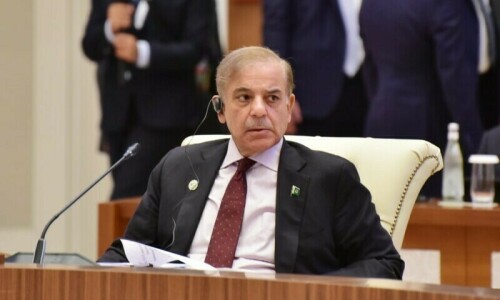ISLAMABAD, March 25: The new government will have to take immediate measures for ensuring food security in the country.
This was stated by speakers at a conference on “Assessment of food security/right to food in Pakistan” here on Tuesday. The conference was organised by Actionaid and Sustainable Agriculture Action Group.
Pakistan witnessed a substantial increase in import of fruit and vegetables, pulses, cotton and oil seeds and sharp fluctuations in the import of wheat, sugar and vegetable oils, which put the country in the list of food insecure nations. Better productions of wheat last year could not benefit the masses, as poor polices of the government led to flour crises and hikes in essential food items.
Country director ActionAid Fikre Zewide said civil society may come up with practical suggestions for the government to improve the security and availability of food.
He said in today’s world, access to food was uneven. Despite having sufficient production, millions experienced scarcity of food and hunger, he added.
Food summit 1996 states that food security exists when all people, at all times, have physical and economic access to sufficient, safe and nutritious food to meet their dietary needs and food preferences for an active and healthy life.
According to recent study of the World Food Programme and Sustainable Development Policy Institute, food insecurity is prevailing in rural areas of Pakistan. Out of 120 districts, 74 were found food deficit in terms of availability.
There is a close relationship between food security, poverty and disease and all these are linked to state stability. So food is not only a trade commodity but is also a socio-political issue. Food security has strong connection with a nation’s sovereignty. If the people of a country depend for their next meal on the vagaries of the global economies, then national sovereignty is considered at stake.
Sohail Mohammad Khan said it was government’s responsibility to ensure right to food, as Pakistan was a signatory to many international covenants. Giving comparative data on food security in South Asia, he presented policy recommendations for the stakeholders.
Dr Wajid Pirzada suggested that subsidy programme targeting the poor would improve the production. Prof Mushtaq Mirani from Sindh said feudalism was one of the reason for food insecurity.
He said monsoon water of Balochistan was wasted and there was no mechanism to conserve it. He criticised the unjust distribution of water in Sindh which he said was causing food insecurity in the province.
Dr Faqir Anjum said livestock was highly neglected but in last three years the government had been focusing on this sector. He warned that irrational use of pesticides was the main reason for food insecurity. He also stressed that laws related to food should be amended according to present situation and should be harmonised at the province level.













































Dear visitor, the comments section is undergoing an overhaul and will return soon.